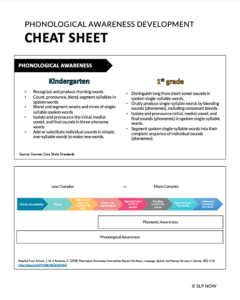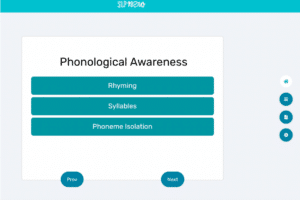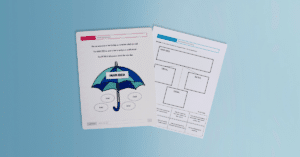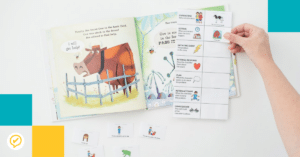This is a guest blog post by Monica, a school-based SLP, all about the importance of phonological awareness development. Scroll down to access the free download!
The Importance of Phonological Awareness
Phonological awareness always feels like something you hear about everywhere, and with good reason! It’s the earliest indication of reading skills in students (Gillon, 2000) and working on phonological awareness has been shown to improve speech sound disorder therapy outcomes in preschool students (Tambyraja & McCauley, 2012).
It makes sense when we think about a phonological disorder as a language disorder (Bowen, 2011). I love incorporating phonological awareness in my sessions because it’s a small effort for a big reward! You’re probably already using phonological awareness in your sessions (hello, minimal pairs)!
Phonological awareness is quick and easy to both assess and include in your therapy sessions. I promise! In doing so, you can also prevent your students from developing reading difficulties later in life (Gillon, 2000).
SLP Now has you covered if you want to know more about phonological awareness! I’ll link to some of our podcasts, blog posts, and give you a preview of the available materials to members.
But first… Click here to access the Phonological Awareness Development Chart freebie!

SLP Now Phonological Awareness Resources
SLP Now Blog Posts (free)
How to Target Phonological Awareness in Speech Therapy
SLP Now Podcast (free)
Podcast #98: A Quick Review of Phonological Awareness
Podcast #99: Phonological Awareness Assessment and Goals
Podcast #100: Phonological Awareness Treatment Ideas
Podcast #101: What We’ve Learned About Phonological Awareness
SLP Now Membership
Phonological Awareness Skills Pack
Phonological Awareness Smart Decks

Bonus Resources
The ATLAS-PA is a free phonological awareness test. The best part is that you can use it for students who have disabilities related to speech production.
The CUBED Dynamic Decoding Measures include a segment that quickly tests phonemic awareness, word identification, and decoding. This test is also free!
I hope you’ve found some helpful information that you can start incorporating phonological awareness into your sessions.
References
Bowen, C. (2011). What is the difference between an articulation disorder and a phonological disorder? Retrieved from http://www.speech-language-therapy.com/ on 10/29/2011.
Gillon Gail T. (2000). The Efficacy of Phonological Awareness Intervention for Children With Spoken Language Impairment. Language, Speech, and Hearing Services in Schools, 31(2), 126–141.
Tambyraja, S. R., & McCauley, R. J. (2012). Do Phonemic Awareness Interventions Improve Speech in Preschool Children with Speech Sound Disorders? EBP Briefs. Volume 7, Issue 3. In EBP Briefs (Evidence-based Practice Briefs). NCS Pearson, Inc.






Leave a Reply